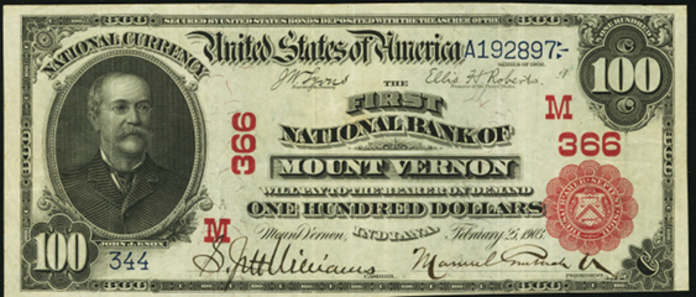One Hundred Dollar Notes › Nationals › 1902 One Hundred Dollar National Bank Notes › Illinois Charters › 1902 $100 Lexington Illinois First National Bank
Get Value Now
| Item | Info |
|---|---|
| Series | 1902 |
| Charter | #2824 First National Bank of Lexington, Illinois |
| Year Chartered | 1882, 243 Banks Chartered |
| City Info | Lexington is a city in McLean County, Illinois, United States. The population was 2,060 at the 2010 census. There are two theories regarding the etymology of the city name. One says it was named for the Battle of Lexington, where General Gridley's father fought. and the other that it was named for the home town of James Brown, the town's co-founder. Source: Wikipedia |
| Similar Cities | 19 banks with similar city. First 12 below: 1. Lexington, Kentucky - First National Bank 2. Lexington, Kentucky - First and City National Bank 3. Lexington, Kentucky - Fayette National Bank 4. New Lexington, Ohio - First National Bank 5. Lexington, Kentucky - National Exchange Bank 6. Lexington, Kentucky - Second National Bank 7. Lexington, Kentucky - Phoenix and Third National Bank 8. Lexington, Nebraska - First National Bank 9. Lexington, Kentucky - Phoenix National Bank 10. Lexington, Nebraska - Dawson County National Bank 11. Lexington, Virginia - First National Bank 12. Lexington, Oklahoma - First National Bank |
| Seal Varieties | Red, Blue |
| Other Info | 1. Value depends on notes known for charter, condition and market demand. |
| Neat Fact | Engraved date is when bank was organized, a 20 or 40 year anniverary of its organization, or date of title change (Kelly, 5th Ed. P 5 & Huntoon 1995). |
No Obligations Offers and Appraisals
Please submit a good photo or scan. It will be identified and evaluated. Understand there may be subtle differences between the image you see above and your note. Signatures, design, markings and note condition will determine the offer price. Notes in Uncirculated or better condition receive the best offers.
Appraisals can be estimated for wholesale and retail prices. Wholesale is what dealers typically pay. Retail is what a collector might pay. Retail is slightly higher in most cases.
Please visit this page for USA Paper Money Reference. Do not treat this page as a reference guide, it is for appraisal and acquisition purposes only.
